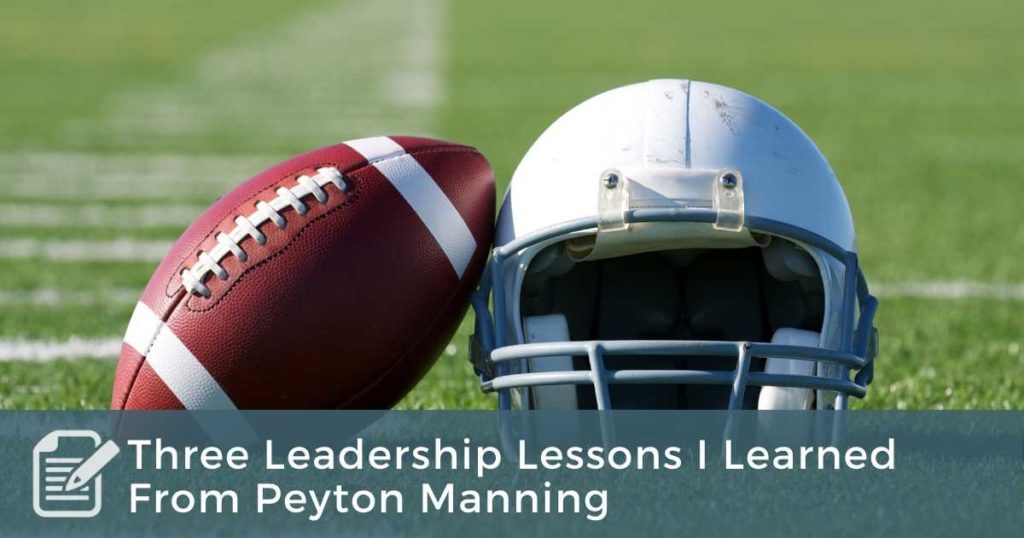 Peyton Manning is unarguably one of the best quarterbacks ever to play in the NFL. At the ripe old age of 39 (that’s 115 in the NFL), he has two Super Bowl rings and the respect of every defense in the league. What I respect most is that he is always a class act, always giving credit to his opponents, his coach, his offensive line, his receivers, and this year in particular, to his team’s defense.
Peyton Manning is unarguably one of the best quarterbacks ever to play in the NFL. At the ripe old age of 39 (that’s 115 in the NFL), he has two Super Bowl rings and the respect of every defense in the league. What I respect most is that he is always a class act, always giving credit to his opponents, his coach, his offensive line, his receivers, and this year in particular, to his team’s defense.
His rival in this year’s Super Bowl was Cam Newton (makes me wonder if this young Carolina icon was named because of his parent’s admiration for Coach Approach Ministries). Cam is 25 years old (that’s 25 in the NFL) and was named MVP of the league this year. But wow was he a sore loser. He could learn a lot from Peyton Manning. So could we.
Let’s take three leadership lessons from Future Hall of Famer Peyton Manning.
Shout Omaha
The only thing you need to know about football to understand this point is that the quarterback is in charge of moving the football down the field. Peyton huddles his players in a circle and gives them some basic directions. They walk up to the line of scrimmage and take their positions. This is when Peyton Manning moves to Omaha.
Standing behind the center, who will snap him the ball, Manning starts shouting one very familiar word, “Omaha! Omaha!” I know what you’re thinking. Nebraska? What other Omaha is there? In Manning’s early days, Omaha was a play, but now it is a word that simply settles his mind. His brother Eli, quarterback of New York Giants, says that Omaha tells the whole team to settle down and focus on this one play.
As Peyton Manning lines up to do his one job, moving the football down the field, he isn’t thinking about the pain in his shoulder or his foot or his hip. He isn’t thinking about how Richard Sherman intercepted his last pass. He isn’t wondering if people think he is a joke for still being in the league at his advanced age. He is only thinking about moving that football. Omaha puts him and his team into a purposeful and free state of mind.
When it is time for you to move your life or work down the field, you need to clear your mind of all your past failures and pains. I suspect every morning as you engage in your work, you need to move to Omaha.
If you’re a preacher, I dare you to shout Omaha a few times before you get started sharing from God’s Word. If you are a husband and your wife needs your attention, rip out a few Omahas to get your mind focused on your spouse. If you are a leader and have a tough decision to make, clear your mind of what people might think or the high cost or making a mistake. God has called you to make this decision. Omaha!
What is it that centers you? For me, it is reading Scripture in the morning, taking a run, eating some protein for breakfast, and talking to my wife. I try to talk to my wife every day, and then do two out of the other three every day. That doesn’t mean you should eat protein for breakfast or talk to my wife every day. I’m fairly sure you shouldn’t yell Omaha before every big decision.
Like Manning, you need to see what worked for you in the past. Even by accident. How can you work this centering action into your everyday life? There is no doubt you will perform much better in Omaha.
I’ll give you one more hint. Jesus lives in Omaha. Go live where Jesus lives in Matthew 6 and don’t worry about tomorrow. Live in the moment of your most important decision of the day. The one you need to make right now.
Study the Defense
When Peyton Manning isn’t playing offense, he is studying his notes. Every other football player on the sidelines is drinking some water, breathing from an oxygen mask, having a trainer work on his neck, watching the game, or spitting. I’ve never spit as much in my entire life as a professional athlete does in one game. Manning is studying like he has a history midterm immediately after the game and his whole playing career depends on this one grade.
His notes are probably about the opponent’s defense. The notes are an analysis of what formations the opposing team took during the last campaign. They tell which defensive player was a little slow or distracted. Manning studies which receivers were wide open and which could get open with a little more effort. The notes are a future forecast of which run play and which running back will most likely be able to pick up some yards in the next offensive opportunity.
You need your own notes on your own opponent. Like Peyton Manning, when you’re not in the game, you need to be studying how you might get an advantage.
Who is my opponent? The better question is what is my opponent? I’m a leadership coach who helps people move their organizations down the field. My offense is to create new cultures. My opponents are a culture that discourages people from leaning into their strengths and standing out, a culture that teaches gratification should be instantaneous and requires no long term commitment, and a culture that can’t see anyone else’s point of view.
What notes do I need? I often listen to Tim Ferris’ podcast where he interviews top performers and dissects their patterns. (Warning: he can also be very annoying.) I listen to audio books on how gifted people get ahead (such as Malcolm Gladwell’s David and Goliath: Underdogs, Misfits, and the Art of Battling Giants). I read Seth Godin’s daily blog on how to break through the noise (not as much lately though). I attended the Q conference in Boston last year where they carefully let a variety of Christian viewpoints be communicated about the most controversial issues in America.
But these won’t work for you. Your notes will depend on what your opponent happens to be. Your notes depend on how you learn best. You might notice from my list that I learn best by hearing. If you’re regularly coached (and if you are doing anything significant, you should be), use a session to figure out what is your opponent and what your notes should look like. Peyton Manning wants to move the ball forward. I want to move people forward. What do you want to move forward?
Sacrifice Your Body
After studying the defense, and shouting a few Omahas, the football is snapped into Peyton Manning’s hands. The whole field explodes with motion. Unless Manning hands the ball off to a running back, he is looking downfield for an open receiver. All the time he is looking, 300 pound grizzly bears are running at him like he’s today’s lunch. He barely pays any attention to them. Manning never throws with fear.
The most amazing feature of Manning to me is when he gets blindsided. He is in the process of throwing the ball, and in mid-throw, “WHAM,” the angry bear rises up from his haunches and envelopes his prey. Two things stand out to me. One, Manning doesn’t protect himself. Two, he continues to throw the ball.
Manning is so focused on throwing this ball with a perfect spiral right into the numbers of his open receiver that he is oblivious to what may happen to him in the process. He plays with wide-open abandon. You need to be so committed to whatever it means for you to move your football down the field that you aren’t worried about getting hit. And you will get hit.
People will get mad. People will talk. The late Supreme Court Justice Antonin Scalia told interviewer Charlie Rose, “A man who has made no enemies is probably not a very good man.” Being liked is overrated. Honestly, that is the hardest truth for me to hear in this whole post.
If you’re doing something important, there will be somebody who wants to stop you. Manning will spend the rest of his life nearly crippled because of his commitment to moving pig skin down the field.
What do I protect too much? Where am I most worried about getting hit? Peyton Manning did two things before he threw the ball. One, he centered himself so he wasn’t distracted by the pain of the past. Two, he studied where he could be the most effective. Then he threw the ball with utter confidence and left his personal protection to five prize bulls who get paid very well to keep him safe.
I worry too much about being misunderstood. I worry too much about being thought of as weird. I worry too much about being labeled a failure. What do you worry too much about? Let people misunderstand. Let yourself be labeled. Playing wide open, you will move the ball down the field, and that is all that should matter.
Conclusion
Manning has made millions of dollars for his focus and sacrifice. But he would have done it for nothing because he loves football. What do you love enough to live this kind of life? Jesus made you for a purpose. Let’s learn from Peyton Manning and from Jesus and move the ball He has given us down the field with purpose and confidence.


